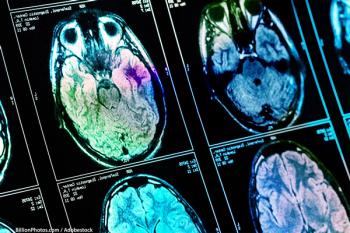
Oncology NEWS International
- Oncology NEWS International Vol 14 No 4
- Volume 14
- Issue 4
Temodar Approved for Treating GBM in Combination With Radiotherapy
ROCKVILLE, Maryland-The Food and Drug Administration (FDA) has approved a new indication for Temodar capsules (temozolomide, Schering-Plough) for use concurrently with radiotherapy for the treatment of adults with newly diagnosed glioblastoma multiforme (GBM) and as maintenance therapy after radiotherapy. The FDA based its decision on study data that showed a statistically significant overall survival benefit in such patients.
ROCKVILLE, MarylandThe Food and Drug Administration (FDA) has approved a new indication for Temodar capsules (temozolomide, Schering-Plough) for use concurrently with radiotherapy for the treatment of adults with newly diagnosed glioblastoma multiforme (GBM) and as maintenance therapy after radiotherapy. The FDA based its decision on study data that showed a statistically significant overall survival benefit in such patients.
The FDA also granted Temodar full marketing approval for the treatment of adult patients with refractory anaplastic astrocytoma, for which it initially received accelerated approval in 1999.
Temodar is an oral cytotoxic alkylating agent designed to prevent the replication of rapidly dividing cells through the alkylation of DNA by the diazomethane precursor MTIC, a compound to which the drug is converted. Physicians diagnose between 8,000 and 10,000 new cases of GBM annually. Researchers have not demonstrated that the drug is effective in treating pediatric patients.
FDA granted priority review last September to the company’s application for the drug’s indication in GBM, meaning that Temodar, if approved, would provide a significant advance in treating an unmet medical need.
Increased Survival
Schering-Plough submitted a 573-patient phase III trial conducted by the European Organization for Research and Treatment of Cancer (EORTC) to support Temodar’s GBM indication (N Engl J Med 352:987-996, 2005).
Researchers randomized 287 newly diagnosed GBM patients to Temodar plus radiotherapy and 286 to radiotherapy only. The Temodar-treated group received 75 mg/m2 of the drug once daily from their first day until their last day of 42 radiotherapy treatments. This schedule was followed by six cycles of Temodar alone (150 to 200 mg/m2) on days 1 to 5 of every 28-day cycle starting 4 weeks after the last radiotherapy session. Control patients received the same radiotherapy schedule without Temodar.
At the time of disease progression, Temodar was given as salvage therapy to 161 patients (57%) in the radiotherapy-only arm and 62 patients (22%) in the Temodar plus radiotherapy arm.
The addition of concomitant and maintenance Temodar to radiotherapy showed a significant improvement in overall survival, compared with radiotherapy alone: 14.6 months vs 12.1 months (hazard ratio 0.63; P < .0001). "After 26 years of practicing neuro-oncology, I view Temodar as a significant advancement in battling GBM," said Henry Friedman, MD, co-director of the Clinical Neuro-Oncology Program at Duke University’s Brain Tumor Center.
The company also submitted a single-arm, multicenter trial as confirmatory evidence of Temodar’s safety and efficacy in treating refractory anaplastic astrocytoma, which FDA required as part of granting the drug accelerated approval for use in the brain cancer. The study enrolled 162 patients, 54 with refractory disease. In this subgroup, 12 patients (22%) responded and 5 (9%) had a complete response. Response duration in these 12 patients ranged from 16 to 114 weeks (median, 50 weeks); complete responders had a response duration of 52 to 114 weeks (median, 64 weeks).
Progression-free survival in responders was 45% at 6 months and 29% at 12 months. Median progression-free survival was 4.4 months, and median overall survival was 15.9 months.
Adverse Events
During the concomitant phase (Temodar plus radiotherapy) of the European GBM study, adverse events that were more common in the Temodar group included thrombocytopenia, nausea, vomiting, anorexia, and constipation. The most common adverse events across the experience of Temodar use are alopecia, nausea, vomiting, anorexia, headache, and constipation, according to Schering-Plough.
Myelosuppression was the dose-limiting adverse event in the GBM study. When the researchers combined laboratory abnormalities and adverse events, grade 3-4 neutrophil abnormalities, including neutropenia, occurred in 8% of the Temodar patients and grade 3-4 platelet abnormalities, including thrombocytopenic events, were observed in 14%.
Articles in this issue
almost 21 years ago
Novel Prostate Cancer Vaccine Shows Survival Benefitalmost 21 years ago
Exemestane Reduces the Risk of Breast Cancer Recurrencealmost 21 years ago
PSA Velocity Predicts Prostate Ca OutcomeNewsletter
Stay up to date on recent advances in the multidisciplinary approach to cancer.






































